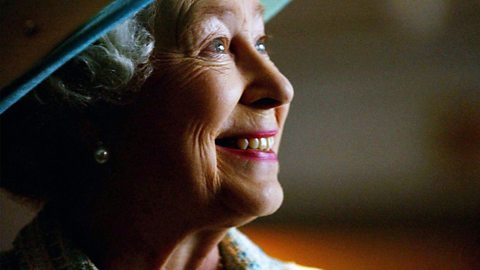Hamilton: An American Musical has become a global phenomenon, but how accurate is this story of one of the US' Founding Fathers?
We delve beyond the remarkable performances with historian Dr Tom Cutterham to discover what historical debates this award-winning musical has provoked.
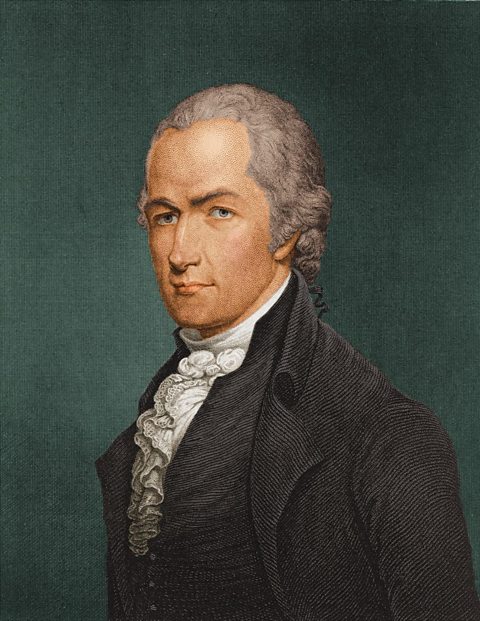 Image source, Stock Montage
Image source, Stock MontageHamilton wasnāt as anti-slavery as he first appears
In the musical, Hamilton is portrayed as being a firm abolitionist, someone who wanted to end slavery. He furiously accuses Thomas Jefferson of using slave labour to pay off the Southās debts and keep the economy afloat.
Hamilton himself was a member of the New York Manumission Society, a group which provided financial and legal assistance to the abolitionist cause. However, he did retain links with slavery and some of the societyās members were themselves slaveholders.
Cutterham highlights how slavery featured in Hamiltonās personal life: āHamilton's close family relations, such as his father-in-law Philip Schuyler, owned dozens of enslaved people, and I've never seen any evidence Hamilton criticised him about it.
āIt's highly likely Hamilton did legal work for slaveowners (including his father-in-law), and of course he was a close friend of George Washington.ā
George Washington, the famed general and first President of the United States, owned over 300 enslaved people by the time he died in 1799. They worked on his Virginia plantation, as well as his home in Philadelphia. This is not mentioned in the musical.
 Image source, Stock Montage
Image source, Stock MontageThe 1800 election exposed the flaws of the electoral college
In the song The Election of 1800, Hamilton is shown to play an influential role in the election of the USā third president. But what it doesnāt convey is how close the country came to a constitutional crisis, unable to choose a president.
In the election of 1800, there were two main political parties vying for success. The Democratic-Republican candidate was Thomas Jefferson and the Federalist candidate was John Adams.
At the time, the president was elected by the electoral college with no popular vote. Each of the 138 electors from across the 16 states had two votes each. The Democratic-Republicans won by a margin of 73 to 65 electoral votes over the Federalists.
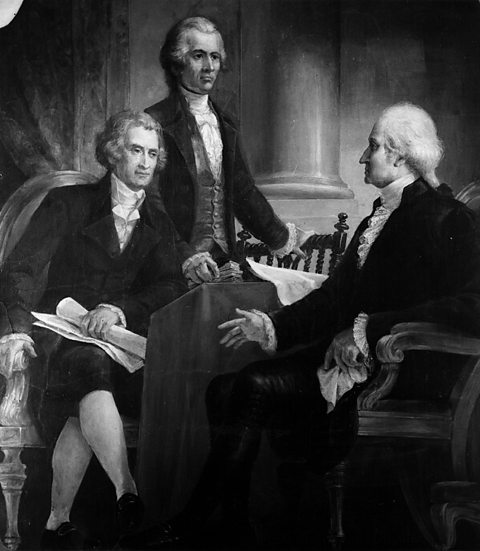 Image source, Three Lions
Image source, Three LionsEach political party had put up two candidates, one that they intended to be president and the other vice-president. Aaron Burr, a lawyer and a former Senator, was to be Jeffersonās vice-president, and so needed to come second in the ballot. But there was a flaw in the plan.
When casting their two votes on the ballot, the electors had no way of distinguishing between who they wanted as president and who they wanted as vice-president. All the electors who favoured the Democratic-Republican party simply gave both their votes to Jefferson and Burr. With an equal number of votes, the two tied for the presidency.
It was up to the House of Representatives, dominated by the opposition Federalists (Hamiltonās party), to break the deadlock.
Each of the 16 states got one vote. Most Federalists disliked Jefferson and so planned to prevent him becoming president by voting for Burr. Burr himself refused to confirm that he would turn down the presidency if offered, fuelling suspicions that he could betray Jefferson.
Listening to The Election of 1800, youād be forgiven for thinking they were describing a modern election and all their cliches. There are references to Jefferson being elitist, while Burr is approachable and someone you can grab a beer with.
Whilst Cutterham states that āBurr certainly didn't run a "man of the people" campaignā, he does acknowledge that Burrās āwing of the Democratic-Republicans in the north of the country did appeal to artisans and poorer folks more than those who voted Federalist.ā
 Image source, Three Lions
Image source, Three LionsHamilton steps into the fray
As shown in the musical, there was no love lost between Hamilton and Jefferson. However, Hamilton felt that Burr was a man of little principle, who simply wanted to be president as a matter of personal ambition. Whilst their paths didnāt cross as often as the musical suggests, Burr had previously defeated Hamiltonās father-in-law Philip Schuyler in a race for the New York Senate.
Unexpectedly, Hamilton wrote a series of letters calling on his fellow Federalists to vote for Jefferson over Burr. After 36 different ballots, Jefferson finally won the presidency.
How influential Hamiltonās opinion was is debated. Cutterham states: āHistorians consider the musical's portrayal to exaggerate Hamilton's role and influence - he definitely lobbied Federalist Congressmen to favour Jefferson over Burr, but how important that was is hard to say.ā
Itās implied in the musical that Jefferson prevented Burr from becoming vice-president. Whilst this is not true, Cutterham highlights that āthey certainly did fall out spectacularly after the end of his vice-presidential term when Jefferson had him tried for treason.ā
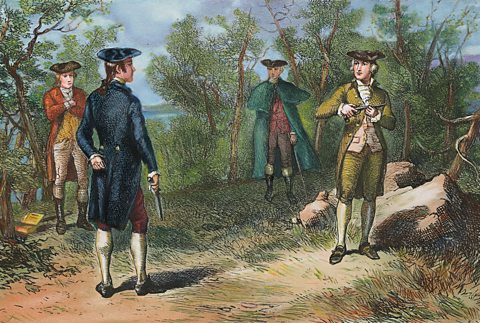 Image source, Bettmann
Image source, BettmannTo simplify the narrative, the musical also suggests Burr was so angry at Hamiltonās intervention that he challenged him to a duel, resulting in Hamiltonās death. In fact, it was not until Hamilton disparaged Burr in a separate election for the governorship of New York in 1804 that pistols were drawn.
To stop such a tiebreak election occurring again, a 12th Amendment to the Constitution was passed. It clearly states that electors āshall name in their ballots the person voted for as President, and in distinct ballots the person voted for as Vice-Presidentā. No longer would the runner-up automatically become vice-president.
The ambiguous relationship between Hamilton and Angelica Schuyler
When it comes to the life of Angelica Schuyler, the musical takes a bit of artistic license.
For starters, there were eight Schulyer siblings who lived to adulthood, including three sons.
This directly contradicts Angelicaās lyrics that as the eldest daughter of a man with no sons, it was up to her to do all the social climbing. Given Hamiltonās background as a penniless orphan, he would not have been seen as a suitable match in this scenario and so Angelica quickly discounts the possibility.
In fact, Angelica was already married with two children by the time of their supposed meeting. She and her British husband John Church later moved to Paris.
Hamilton and Angelica did keep in contact over the years through letters, which have been pored over for signs of a hidden romance. The musical plays with this idea in the song Take A Break, highlighting the crucial difference the comma placement makes in the phrase "My dearest, Angelicaā. A grammar mistake or a deliberate confession of love?
Cutterham states that āthey were definitely flirtatious in letters to one another, but it would be wrong to take that as evidence they had an affair.ā
He points to the work of the historian Cassandra Good, who he believes āshows convincingly that this kind of flirtatiousness was pretty standard for their class at the time.ā
Six blockbuster films that got history wrong
From Bohemian Rhapsody to Titanic, movie-makers have been very creative with historical timelines.
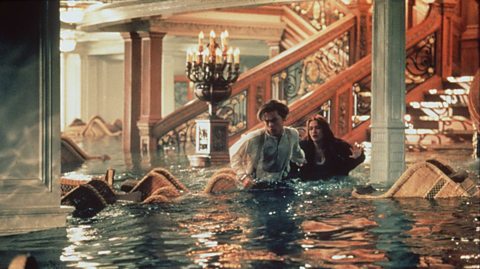
Why is St Patrick's Day so popular in America?
The patron saint of Ireland's popularity in the USA and across the globe.
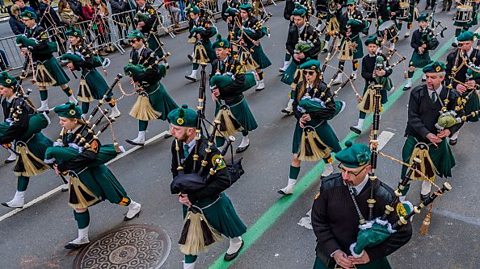
Women who rule: Five formidable queens from history
Find out about some more famous queens from history.
